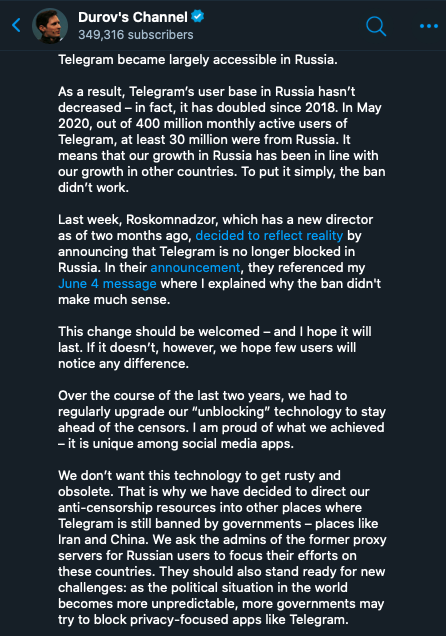Telegram is an increasingly popular private messaging app that’s banned in places where Facebook’s WhatsApp isn’t – which should, in itself, be revealing.
Last week, Russian authorities lifted a two-year long ban on the popular messenger, Telegram. The owner of the app now wants to dedicate anti-censorship resources to other countries where the app is still inaccessible, such as China and Iran.
Russian telecom watchdog Roskomnadzor blocked the messenger app in 2018 after the owner refused to give the government access to the end-to-end encrypted system. Telegram’s refusal to cooperate goes against Russia’s counter-terrorism laws, which obligate messaging providers to allow the government access to encrypted messages. Telegram’s CEO and founder, Pavel Durov, a Russian in self-imposed exile, refused to cooperate because “privacy is not for sale, and human rights should not be compromised out of fear or greed.”
Telecoms were instructed to ban the app. But it was only temporarily unavailable. The ban inspired the app’s developers to work on anti-blocking tools, an initiative the company dubbed “Digital Resistance.”
The app has been in use in Russia for the past two years, registering impressive growth. Of its 400 million monthly active users, it is estimated that 30 million are from Russia. Among the app’s most active users are Russian government officials and agencies. In fact, task forces for COVID-19 in Russia prefer to use Telegram for updates.
Speaking to reporters in April this year, a spokesperson for Kremlin (the Russian executive arm of government), Dmitry Peskov, said, “There’s a court ruling, and actions to block were based on it. But you’re right, it’s true, the situation de facto is different.”
A few weeks ago, Durov asked authorities to lift the ban so users of his app can use it “with more comfort.” He also said that Telegram has since improved its tools to search for terrorism and extremist-related content without violating users’ privacy. When it was banned, authorities claimed that terrorist groups were exchanging messages through the app.
On June 18, the Russian telecom watchdog lifted the ban claiming that it reverted the decision due to “readiness expressed by the founder of Telegram to counter-terrorism and extremism.”
In a post on Durov’s Channel on June 21, the CEO expressed his contentedness with Russia’s decision to lift the ban. He noted that the ban led to the development of the Digital Resistance movement, which has since greatly improved its unblocking tools. To make sure the technology remains active and continues growing, Durov said Digital Resistance resources would be directed to other regions where Telegram remains banned.

“We don’t want this technology to get rusty and obsolete. That is why we have decided to direct our anti-censorship resources into other places where Telegram is still banned by governments – places like Iran and China. We ask the admins of the former proxy servers for Russian users to focus their efforts on these countries. They should also stand ready for new challenges: as the political situation in the world becomes more unpredictable, more governments may try to block privacy-focused apps like Telegram,” part of the post read.










